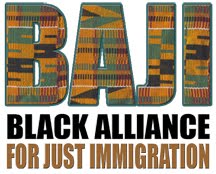The Black Alliance for Just Immigration and groups all across the U.S. are calling upon the Department of Homeland Security to create a Haitian Family Reunification Parole Program – like the still-ongoing Cuban Family Reunification Parole Program it created in 2007 and immediately grant visas to the 105,000 Haitians already approved
Before the January 20120 earthquake, Haitian democracy was and is still being subverted by the actions of the United States, France and other Western nations. As a result, Haiti is the poorest country in the Americas. The earthquake was a devastating blow to the country. Like Katrina in New Orleans, the disaster in Haiti uncovered the underlying racism and economic exploitation that the people of Haiti have been suffering for centuries.
And like New Orleans, where black people were being demonized, criminalized and marginalized by the police, U.S. government, U.N. authorities, rightwing pundits and the U.S. media. There is much talk in the media about the endemic corruption in Haiti. Yet, there is no discussion about U.S. complicity in condoning and supporting dictators, US backing of the 2004 overthrow and kidnapping of Jean Bertrand Aristide, the democratically elected president of Haiti. Nothing is said about the long history of U.S. corporations exploiting Haitian workers in the foreign-owned sweatshops and factories. Despite billions of dollars in donations, 80% of the Haitian people are still living in poverty. Millions of unemployed and impoverished Haitians resided in and around the capital city of Port-au-Prince in substandard, earthquake-prone housing
Prior to the earthquake, the Department of Homeland Security (DHS) had approved the immigrant visa petitions of 105,000 Haitians. They must wait years longer in Haiti due to the visa backlog. This needs to happen immediately. And it can happen!
Alameda County: http://www.change.org/petitions/alameda-county-board-of-supervisors-pass-a-resolution-in-support-of-a-haitian-family-reunification-program
Contra Costa County: http://www.change.org/petitions/contra-costa-county-board-of-supervisors-pass-a-resolution-in-support-of-a-haitian-family-reunification-program
Richmond City Council: http://www.change.org/petitions/richmond-california-city-council-pass-a-resolution-in-support-of-a-haitian-family-reunification-program

